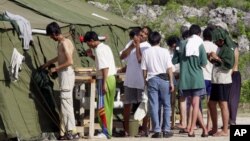U.S. security officers have begun fingerprinting refugees held on Pacific islands in the final stage of assessing who will find new lives in the United States, asylum-seekers said Monday.
Department of Homeland Security officers are taking biometric details from refugees on Nauru, including fingerprints, heights and weights, according to a document circulated among asylum-seekers and provided to AP by Mehdi, a refugee on the island nation who for security reasons did not want his family name published.
U.S. officials began scheduling appointments with asylum-seeker families on Nauru from Monday, Mehdi said.
Refugees had been given no indication of how long the security vetting process would take, he said.
The Department of Homeland Security did not immediately respond to a request for comment on Monday. The Australian Department of Immigration and Border Protection declined to comment.
President Donald Trump has reluctantly agreed to honor an Obama administration deal to accept up to 1,250 refugees refused entry into Australia, but has said they will be subjected to "extreme vetting." There are few details on what that means.
Australia pays Nauru and Papua New Guinea to keep more than 2,000 asylum-seekers -- mostly from Iran, Afghanistan and Sri Lanka -- in conditions condemned by rights groups.
An Australian immigration official told an Australian Senate committee three weeks ago that Homeland Security officers were poised to start vetting refugees on the islands as soon as they were authorized.
State Department officials have already conducted the first stage of the two-stage process, with preliminary interviews on the islands to ensure that candidates for resettlement were genuine refugees.
Trump has described the deal with Australia as "dumb" and raised doubts about whether it will proceed.










